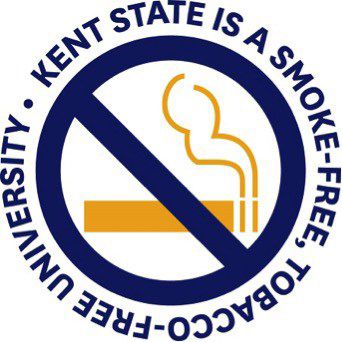Let’s clear the air: An update on KSU’s Smoking Ban

Smoking Ban
The Ohio Board of Regents unanimously voted to recommend the University System of Ohio to adopt a smoke-free policy in 2012. Since then, a growing number of schools have agreed to go tobacco free, and Kent State University joined the list as of July 1, 2017.
“We are working together to create a supportive community where everyone can learn, work and thrive,” said Kent State University President Beverly Warren in an email sent June 28, 2017.
Olivia Shock, a junior visual communication design major, began smoking when she was 11 years old due to peer pressure from an older crowd. Now at age 20, she smokes four to five cigarettes a day and was unsuccessful at quitting when she tried. Although she follows the ban and no longer smokes on campus, she does not think the policy will be effective.
“I don’t think it’ll stop people because I still drive and smoke on campus, you know what I mean? And the people I talk to they’re like, ‘Oh, what are they gonna do? Chase me down on their moped?’ You know? They’re gonna put it out and relight it.”
Before becoming a smoke-free campus, KSU’s smoking policy, introduced in 2006, prohibited smoking inside buildings and required smokers to be 20 feet outside of one. Kent State University’s Office of Student Conduct is responsible for dealing with campus policy violations, including for the old and the new smoking policy.
During the fall of 2017, Student Conduct recorded nine violations, compared to the fall of 2016, which had one, and the fall of 2015, which had three.
Each violation is treated as a case-by-case scenario and the basic rules of a student conduct hearing are enacted. The consequence depends on the number of violations previously held by the student and the viewing panel determines the best way to move forward. Community service, reflection assignments and educational workshops are generally used opposed to fines.
According to the Ohio Department of Health, more than 24 percent of Ohio’s smokers are between the ages of 18 and 24. Additionally, college students are showing premature signs of lung and cardiovascular damage.
Cigarettes also contribute to 480,000 deaths per year, with 41,000 resulting from second-hand smoke, according to the Centers for Disease Control and Prevention. Tobacco smoke also contains a deadly mix of more than 7,000 chemicals, hundreds of which are harmful and about 70 of which can cause cancer.
“Being exposed to secondhand smoke is a significant risk factor and it’s a little scary that for years and years it was never considered and never an issue,” said Mary Kutchin, a Kent State graduate student in the school of nursing. “I’m actually old enough that when I started working in the hospital, people were allowed to smoke in the hospital rooms.”
The new policy covers all domestic and international Kent State campuses and applies to all members of the universities, including volunteers, vendors, visitors and customers. Any property owned, operated and leased by Kent State prohibits tobacco use, including personal vehicles parked on the property.
The ban restricts the use of nicotine, oral tobacco, hookah, e-cigarettes, smokeless tobacco and non-FDA approved nicotine products. So far, Todd Kamenash, the assistant dean of students and director of student conduct, said the ban is successful.
“As I walk around campus, it’s a lot more rare for me to see people just walking around smoking,” he said. “Especially in the winter time, you know you go inside and outside of the library, the Student Center, some of the more populated places and it always smelled like smoke and I feel it’s not like that now. So I can say anecdotally, I feel like it’s made a big difference.”
Other participating public schools in Ohio include Bowling Green State University, Cleveland State University, The Ohio State University, The University of Akron and Ohio University.
“The healthy campus initiative, Kent State of Wellness, aligns with the vision and goal outlines in our Strategic Roadmap to a Distinctive Kent State,” said Warren. “Most importantly, it is the right action to take to ensure a healthier environment for every member of our community.”
Find facts about tobacco use: https://prezi.com/view/wjEZmTr3EeZYcnyAKbVR/
Sierra Allen and Julie Riedel are staff writers. Contact them at [email protected] and [email protected].


